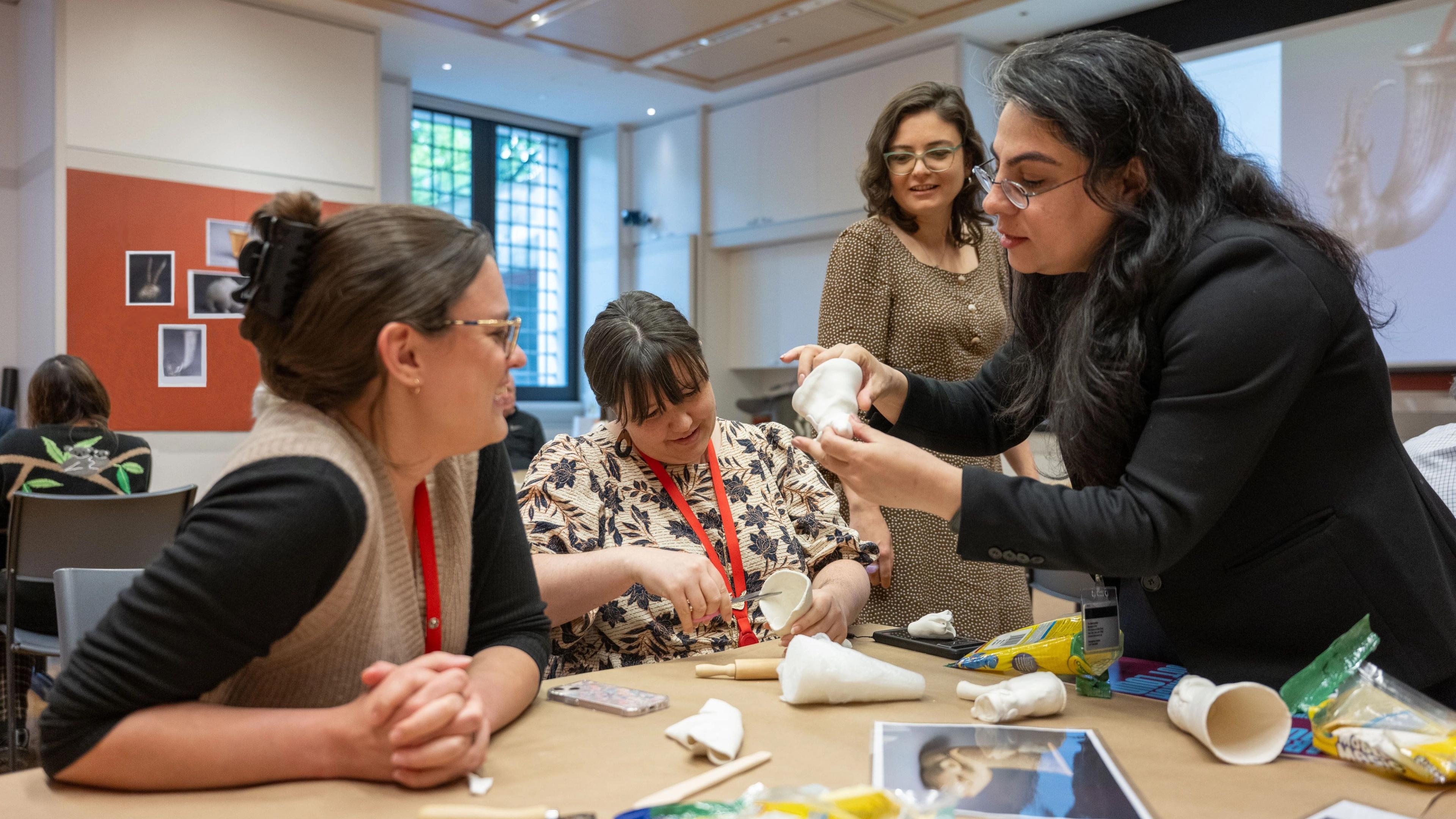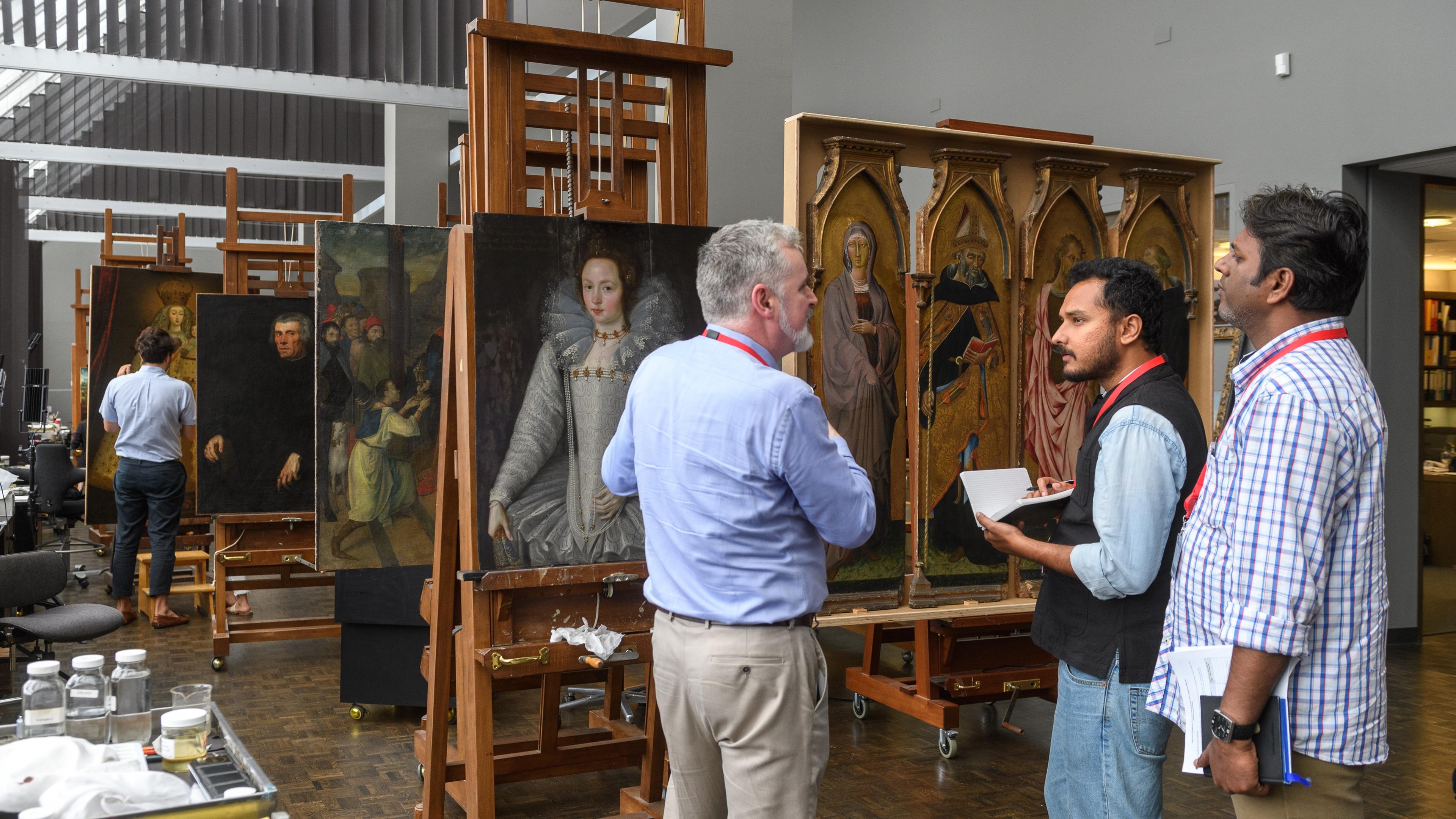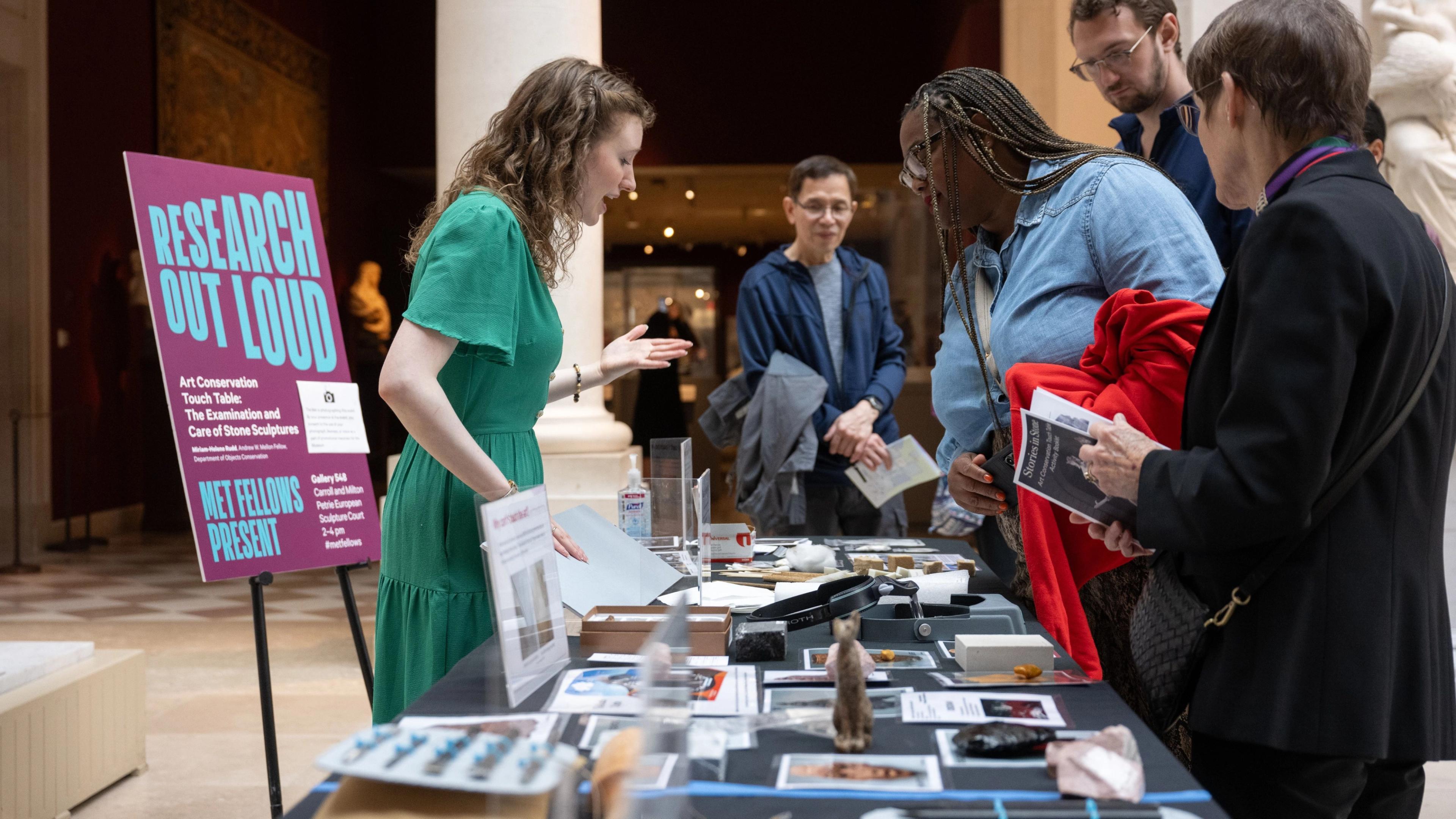Andrew W. Mellon Postdoctoral Curatorial Fellowship
About the Fellowship
The Andrew W. Mellon Postdoctoral Curatorial Fellowship is a two-year fellowship that provides an opportunity for a postdoctoral scholar at an early stage of their career to gain curatorial training and experience, and to engage with a community of staff and scholars from around the world. These fellows work with a curatorial supervisor and mentor on a specific project related to The Met collection or an upcoming exhibition. The fellowships are intended to strengthen the curatorial profession at large by training promising emerging scholars for curatorial careers.
The fellows also have the opportunity to engage in an independent project in consultation with the supervising curator, and they take part in the overall Fellowship Program as well as the annual Research Out Loud: Met Fellows Present.
2026–2028 Fellowships in Egyptian Art or Islamic Art
Egyptian Art
Fifty years after first unveiling its galleries dedicated to Old Kingdom art, the Department of Egyptian Art is embarking on a transformative new project. This initiative aims to reimagine the presentation of sculpture, relief, and other types of objects in the collections’ introductory galleries. Over the decades, gallery installations have explored a range of themes, often in dialogue with changing perspectives in scholarship and The Met’s exhibitions, Egyptian Art in the Age of the Pyramids (1999–2000) and Dawn of Egyptian Art (2012). Now, half a century later, the Department is seizing this moment to reflect on how current and future narratives can be meaningfully conveyed in these spaces.
The objects on view illuminate the work of Egypt’s earliest artists—those who experimented with form and expression before the formal conventions of Egyptian art were fully established—as well as the achievements of master craftsmen from the age of the pyramids, whose work reveals remarkable observation and sensitivity. Recent scholarship, however, has prompted new perspectives on art and culture in these periods, such as the importance of sites outside the capital and the ever-changing dynamic between the king and his elite, calling for a fresh approach as to how we introduce Egyptian art, culture, and language to our many visitors.
The Andrew W. Mellon Postdoctoral Curatorial Fellowship in the Department of Egyptian Art 2026–2028 provides an opportunity to engage deeply with this work. The fellow will gain curatorial experience and training through working closely with curators in the department on the study and interpretation of artworks from Egypt’s earliest days to the end of the third millennium BCE. A key aspect of the fellow’s project will involve tracing their biographies from their ancient origins to their modern histories. This project will play a vital role in shaping the Department’s curatorial vision and storytelling within these galleries. In addition, the fellow will participate fully in Fellowship Program activities. Ideal candidates will have a specialization in Egyptology or adjacent fields, with a keen interest in material culture, curatorial practice, and museum work. Proficiency in German and French is required.
Learn more about the Department of Egyptian Art.
Islamic Art
The Andrew W. Mellon Postdoctoral Curatorial Fellowship in the Department of Islamic Art 2026–2028 will provide significant curatorial training through work on the upcoming exhibition Jahangir: Emperor, Connoisseur, Naturalist of Mughal India, 1605–27 (working title), scheduled to open in Spring 2028. Working closely with the curator of the exhibition, the fellow will develop advanced skills and gain experience in the following areas of art museum curation: art historical and historical research on objects, provenance research and ownership history of the objects, catalogue development, writing gallery labels and didactics, developing digital/web features and resources, addressing conservation, installation, and design issues, and outreach and academic exchange. The fellow will also have the opportunity to contribute original research to the exhibition. In addition, the fellow will participate fully in Fellowship Program activities and departmental activities outside of the exhibition. The ideal applicant should have an academic specialization in the field of Mughal or Persian art history (ideally textiles, carpets, or painting); knowledge of individual artists of the period, as well as the wider history and context of the early modern age; Persian and Devanagari reading skills; knowledge of the materiality and techniques of a specific area of Indo-Persian art production; good writing skills; and some experience with connoisseurship and aesthetic appreciation.
About the Exhibition
The Met plans to present an exhibition on the patronage of the Mughal emperor Jahangir. The Mughal era was one of great accomplishment and inspiration in the arts. Under Jahangir, the fourth ruler in the dynasty, the art of painting, in particular, saw important developments as court artists such as Aqa Riza, Abu’l Hasan, and Ustad Mansur, reached new heights. Jahangir was also an avid collector and, together with his queen Nur Jahan and certain other figures at court, an active patron of hardstone jade carving, the jeweled arts, and textiles, among other things.
The exhibition seeks to bring together an outstanding selection of works of art of the period to illuminate Jahangir’s extraordinary patronage within the context of wider artistic and cultural exchange in the early modern age. From a sweeping cultural landscape of great diversity to intimate and refined works of art of stupendous quality, the artworks will also relate to Jahangir’s captivating personal memoir, the Jahangirnama.
The exhibition will aim to awaken visitors to the art of the period through a connoisseurly presentation, which breaks ground in terms of scholarship and advancement of the field. The diversity of Indian art and culture, even within a concentrated period, will become apparent, as Indian, Persian, and European art styles harmonize at the Mughal court.
Learn more about the Department of Islamic Art.
- Applicants must hold a PhD by the application deadline date, with a specialization related to one of the projects.
- Applicants must have received their PhD no more than five years prior to the application deadline.
- All fellows are expected to have valid US work authorization for the entire duration of the fellowship. If you are not a US citizen or permanent resident, please review the additional details in the Fellowship Application FAQs, and ensure you have confirmed your eligibility prior to submitting your application.
$66,300 annual salary, less applicable taxes and deductions
Travel: Fellows receive a stipend of $6000 to pursue travel related to their research, which is paid through reimbursement
Benefits: Andrew W. Mellon Postdoctoral Curatorial Fellows are eligible to receive benefits granted to full-time, exempt staff of The Met, including health insurance and dental benefits.
Application deadline: Friday, October 17, 2025, 5 pm ET
Notification date: All applicants will be notified by the last Friday in February following the application deadline.
Fellowship period: September 1, 2026 through August 31, 2028
All applications, including letters of recommendation, must be submitted online and in English. The Met will not accept applications or related materials via email, postal mail, or in person.
Andrew W. Mellon Postdoctoral Curatorial Fellowship applicants must submit the following:
- A statement of interest, not to exceed 1,000 words, specifying which Andrew W. Mellon Postdoctoral Fellowship you are applying for, and explaining how the fellowship would meet your research and professional goals. Please include your area(s) of research and specialization, as well as any relevant experiences related to your chosen curatorial area.
- A digital interpretation statement, not to exceed 500 words, addressing the way in which you see yourself contributing to the development of new interpretive research models in the digital environment
- A copy of a published paper or recent writing sample
- A curriculum vitae of education, professional experience, honors, awards, and publications
- Three letters of recommendation. Applicants must submit at least one academic and one professional letter of recommendation. All letters must be submitted in English, and uploaded directly by the recommenders. Recommenders may not be current Met staff, contractors, or volunteers.
What to Expect After Applying
Once submitted, staff in relevant department(s) first review your application to assess the quality and feasibility of your proposed project. If your proposal meets the necessary criteria, the department(s) recommend it for review by The Met’s Grants Committee, which consists of members of The Met’s professional staff appointed by the Museum’s Director and Chief Executive Officer. The committee reviews all aspects of each application submitted using the evaluation rubric. Following this assessment, the Grants Committee submits final award recommendations to the Director and CEO for review and approval. You are notified regarding the result of your application by the last Friday in February.
Please note that due to the lengthy and multiperspective review process, we are unable to provide individual feedback on applications that are not selected.
Selection Criteria
Applications are evaluated based on the criteria set forth in The Met’s evaluation rubric. Reviewers consider all your application materials: your statement of interest, digital interpretation statement, writing sample, CV, and letters of recommendation. They use the rubric to score your application, but this serves only as a guide. There is no cut-off score for progressing in the review process or being awarded a fellowship. View the evaluation rubric. (PDF)
Life As A Met Fellow

Research Support, Community, and Professional Development
Fellows receive financial support, time for research, exposure to museum work, and access to The Met collection and libraries. Weekly programs and workshops bring fellows together with Met staff to share ideas, develop professional skills, and discuss current issues in museum practice.

Department Placement
Fellows are embedded in a curatorial department with a dedicated Met staff supervisor. Learn more about the 2026–2028 host departments for the Andrew W. Mellon Postdoctoral Curatorial Fellowships, the Department of Islamic Art and the Department of Egyptian Art.

Research Out Loud
Research Out Loud: Met Fellows Present connects the fellows with the public through a series of gallery programs and research presentations that offer cross-cultural and transhistorical connections throughout The Met collection.